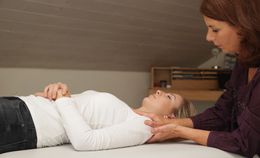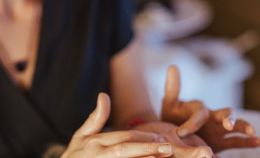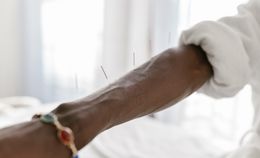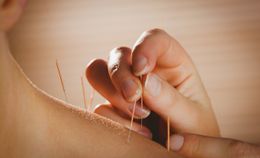Reiki is a powerful form of energy healing that can assist patients undergoing standard medical treatment as an integrative therapy, or to assist anyone in promoting overall health and wellness.
The benefits of Reiki are widely appreciated by practitioners, clients, and increasingly the conventional medical establishment, which is embracing the profound positive impacts of this low-cost, virtually risk-free healing art.
Reiki practitioners are now often seen in hospitals and hospices. Some nurses are learning to deliver Reiki along with standard medical care as an important supportive therapy for their patients. Some studies have even probed the usefulness of Reiki for conventional health care workers themselves, who often suffer the mental health effects of "burnout" in high-stress work environments.
Reiki's increasing use within mainstream health care institutions is just one sign of the growing scientific consensus that complementary therapies in general and Reiki specifically are important elements of total patient care.
This article will share some of the astounding scientific evidence backing Reiki's effectiveness for a variety of health care concerns. But first we must take a closer look at the idea of spiritual healing as a growing partner with conventional medicine. This phenomenon indicates a breakdown in a longstanding myth that scientific and spiritual approaches to healing are incompatible or necessarily in opposition to one another.
Rather, the mounting scientific evidence for Reiki's efficacy in clinical settings shows that although energy healing derives its healing power from different sources and methods than conventional medical treatments, its power is measurable, significant, and provides crucial balance in the modern approach to healing.
Spiritual vs. science: a false divide
As a spiritual energy healing technique practiced in a rich variety of different forms by healers attuned to the distinct needs of their clients and communities, Reiki's mode of efficacy is still shrouded in some mystery.
With this perspective in mind, the mounting scientific research on Reiki's effectiveness may seem somewhat paradoxical. But while the mechanisms through which Reiki works are still widely discussed and debated within the practitioner, patient, medical, and research communities, what's undeniable is the results: Reiki heals. The data are as powerful as the stories you might have heard from friends and family, in testimonials online, or in your own personal experience.
Medical research has not always been accommodating to or interested in spiritual approaches to healing, and its methods have not always been subtle enough to probe them fairly for what they have to offer. Designing studies around a diverse set of spiritual practices is indeed challenging to the standardized routines medical research typically prefers.
However, for many people, it is just these facets of Reiki which carry much of its power to heal: human warmth and empathy as expressed in the healer-client relationship, tapping into universal life force energy to rebalance and restore the individual's vitality, the treatment of the body, mind, and spirit as a whole system, and a recognition of that system's own innate tendency to self-heal.
All of these features underscore Reiki's fundamental status as a healing art and spiritual practice - a distinctly different approach to healing than conventional medicine.
Pamela Miles, a leading Reiki healer and author, explains on her website1 that "Conventional medicine addresses symptoms and conditions with an oppositional warlike approach" to threats like cancer, broken bones and malfunctioning organs. Invasive treatments are often crucial to saving patients lives, but they come at a steep cost, often bringing difficult side effects.
Reiki's healing method is different, Miles explains: "Reiki practice is balancing to your whole system. When your body is balanced, your own self-healing mechanisms function at their very best". Reiki supports the whole system, rather than targeting specific threats (symptoms, illnesses, injuries) for elimination. It is a supportive rather than oppositional approach.
When combined with conventional medical treatments, this humane, holistic approach often provides an important balance that modern medicine has too often shed in its quest for higher-tech, faster-paced, and profit-yielding solutions to ill health and injury.
As an integrative medical approach, Reiki restores balance not only to the individual's energy system but to our modern rituals of healing. As a partner with conventional health care teams, Reiki reinfuses the overall healing process with traditional features whose powers science is only now beginning to adequately acknowledge and document.
These include:
- Social support
- The essential human element of touch
- A connection to powers larger than ourselves that animate all living beings, and
- A gentle but powerful reminder that our biological, psychological, and spiritual systems do indeed know how to help heal themselves if we can only support them and work to unleash their wisdom and power
Studies are increasingly exploring these factors and other elements of Reiki to probe the mechanisms of Reiki's efficacy. Noted Reiki practitioner Pamela Miles eloquently describes some of the biological changes that reveal the connection between mind, body, and spirit that Reiki draws on to help facilitate recovery and well-being.
Miles explains the way Reiki facilitates a shift in the recipient's nervous system. The pressures and pace of contemporary life have many of us in "fight-or-flight" mode much of the time. This is known as stimulation of the reactive sympathetic nervous system. This is a natural biological state that we shift into in order to cope effectively with stress and danger. It stimulates us to act to preserve our basic existence.
However, Miles explains that we also need adequate time in a different mode, known as parasympathetic nervous system dominance. This is also often called "rest-and-digest" mode. With our systems in this state, we can rest, recover, and heal - psychologically and physiologically.
Difficulties arise when we spend too much time in the former state and not enough in the latter. Miles writes,2 "Our bodies simply cannot cope and heal at the same time. It's fight/flight or rest/digest - not both at the same time".
This is probably especially challenging for those undergoing stressful medical treatment in hospitals. At the moment when it would be most helpful to stimulate the body's own capacity for self-healing, we often find ourselves so bewildered, anxious, fearful, and depleted that we can't fully draw on our own inner resources.
This is exactly the kind of moment when Reiki's benefits can be most profound, supporting the clearing of blockages in our energy pathways and strengthening our life force so that we rediscover our natural ability to help heal ourselves. Reiki can help us shift from reactive sympathetic nervous system activation to parasympathetic nervous system dominance, promoting physical healing along with emotional well-being.
With this nexus of the mental, physical, and spiritual elements of individual health and wellness in mind, following are just some of the astounding benefits of energy healing with Reiki that medical research has documented.
Science backs Reiki's efficacy
All of the following are ways in which clinical studies have supported Reiki's effectiveness in helping patients heal from a range of conditions and symptoms.
Pain reduction
Numerous studies show that Reiki can help patients in pain:
- A 2018 meta-analysis conducted by Turkish medical researchers showed Reiki is generally effective as a treatment for pain.3
- Research authored in 2008 by a Hong Kong surgeon and partners showed that touch therapies, especially Reiki, helped to relieve both chronic and acute pain in adults, with more experienced practitioners obtaining the best results.4
- A statistically significant decrease in pain was documented in a 2017 study among women hospitalized for Caesarian deliveries in a Brazilian hospital, when the women's treatment included Reiki and prayer.5
- Researchers at the University of Pittsburgh School of Nursing in a 2014 meta-analysis concluded that Reiki is an effective treatment for pain in adults.6
- Researchers at two US hospitals published results of their study in 2016 showing that Reiki was an effective component of post-operative pain management for patients. This resulted in the hospital investing in a Reiki training program for nurses.7
Calming the nervous system
Several studies have found immediate physiological impacts from Reiki treatment:
- A 2011 study treated health care workers with signs of "burnout syndrome", a mental health status characterized by "emotional exhaustion, depersonalization, and reduced personal accomplishment", according to the published results. Reiki had immediate, measurable positive impacts on heart rate variability, cortisol levels, and body temperature, leading the study's authors to conclude that "Reiki has an effect on the parasympathetic nervous system" of health care workers suffering from burnout.8
- A 2004 Scottish study of Reiki's immediate physiological impacts made a similar conclusion, showing that Reiki significantly decreased heart rate and diastolic blood pressure among study subjects, more than placebo or control groups.9
Helping patients with cancer
Multiple studies have demonstrated the power of Reiki in oncology care:
- Studies have shown that Reiki can improve symptoms of fatigue and improve quality of life among cancer patients.1011
- Reiki is among the biofield therapies shown to be effective in reducing cancer-related pain in this 2012 study from University of Virginia researchers.12
- Reiki can help cancer patients by generally alleviating suffering and distress,1314 promoting relaxation, pain relief, and a sense of peace, and helping to support good self-care and healthy lifestyles.15 Reiki can also help cancer patients sleep better, experience less anxiety, and improve their overall sense of well-being.16
Helping Alzheimer's and dementia patients
Research is looking at how Alzheimer's and dementia patients may benefit from Reiki:
- A 2006 study from researchers in Maine found Reiki is helpful in Improving memory and behavior problems among dementia and Alzhemier's patients.17
Helping people undergoing end-of-life care
Several scientific studies show Reiki's effectiveness in supporting end-of-life care:
- University of Texas School of Nursing researchers published findings in 2015 supporting the use of biofield therapies such as Reiki for relieving pain, improving quality of life and well-being, and reducing stress symptoms in palliative and hospice care.18
- A 2017 study supported the use of Reiki to help manage pain and anxiety in children receiving palliative care.19
Mental health care
Many of the studies already referenced have documented Reiki's effectiveness in relieving negative emotions such as stress and anxiety for people undergoing medical treatment for serious conditions, such as children and adults with cancer.
Additionally, Reiki has been proven effective in other mental health applications:
- Reiki helped to decrease anxiety in cardiovascular patients in a 2010 study by UCLA researchers20.
- Reiki is generally effective in reducing anxiety in adults, according to an in-depth literature review by University of Pittsburgh School of Nursing researchers.21
- A 2019 supported the effectiveness of Reiki for immediately improving symptoms of depression, among other psychological wellness measures.22
- A team of Brazilian researchers concluded in a 2016 paper that Reiki plus yoga was more effective than yoga alone in supporting relaxation among cancer survivors.23
- Further research published in 2016 from Brazilian researchers showed Reiki and massage together were effective in reducing stress and tension and promoting deep relaxation.24
- Self-Reiki helped stressed-out college students cope better and maintain better health and well-being throughout the semester than colleges students not using self-Reiki.25
Supporting overall wellness
Several studies have shown that Reiki promotes overall health and wellness:
- A single 45 to 90 minute Reiki session was shown to provide significant improvements in measures including positive affect, negative affect, pain, drowsiness, tiredness, nausea, appetite, shortness of breath, anxiety, depression, and overall well-being in a 2019 study led by a Harvard University researcher. The authors concluded, "The results from this large-scale multisite effectiveness trial suggest that a single session of Reiki improves multiple variables related to physical and psychological health".26
- Research published in 2017 by Australian scientists showed that Reiki is generally more effective than placebo and has broad applications as a complementary therapy in health care.27
- A 2018 publication by New Hampshire medical researchers showed immediate improvements in numerous patient wellness measures when hospitalized patients were treated with Reiki, including pain, nausea, fatigue, anxiety, depression, and overall well-being.28
- Research published in 2010 led by a London-based author concluded that college students treated regularly with Reiki fared better in overall health and wellness throughout the course of a semester than students in a control group. "The results are suggestive that the Reiki buffered the substantive decline in health in the course of the academic year seen in the No-Reiki group", the authors wrote.29
Even Reiki practitioners benefit!
A literature review by a Rochester, New York-based researcher found that Reiki benefited not only recipients but Reiki practitioners as well.30 The research looked at nurses trained to provide Reiki as a complementary therapy for patients. Clearly, the health benefits of Reiki are profound.
The Bottom Line
As a form of energy work focused on balancing a recipient's life-force energy to support their own ability to self-heal, Reiki is a decidedly spiritual healing modality. But this powerful healing technique's physiological and psychological effects are also well-documented by scientific literature.
As Western medicine continues to embrace non-invasive, low-cost, holistic complementary therapies as a compassionate, effective component of patient care, the evidence for this powerful healing technique will no doubt continue to mount.
References:
1 "How Reiki Helps": https://reikiinmedicine.org/popular/how-reiki-healing-helps/
2 "How Reiki Helps": https://reikiinmedicine.org/popular/how-reiki-healing-helps/
3 "The effect of reiki on pain: A meta-analysis": https://www.ncbi.nlm.nih.gov/pubmed/29551623
4 "Touch therapies for pain relief in adults": https://www.ncbi.nlm.nih.gov/pubmed/18843720
5 "Is Reiki or prayer effective in relieving pain during hospitalization for cesarean? A systematic review and meta-analysis of randomized controlled trials": https://www.ncbi.nlm.nih.gov/pubmed/28443949
6 "Effect of Reiki therapy on pain and anxiety in adults: an in-depth literature review of randomized trials with effect size calculations": https://www.ncbi.nlm.nih.gov/pubmed/24582620
7 "Reiki's effect on patients with total knee arthroplasty: A pilot study": https://www.ncbi.nlm.nih.gov/pubmed/26760383
8 "Immediate effects of reiki on heart rate variability, cortisol levels, and body temperature in health care professionals with burnout": https://www.ncbi.nlm.nih.gov/pubmed/21821642
9 "Autonomic nervous system changes during Reiki treatment: a preliminary study": https://www.ncbi.nlm.nih.gov/pubmed/15674004
10 "Pilot crossover trial of Reiki versus rest for treating cancer-related fatigue": https://www.ncbi.nlm.nih.gov/pubmed/17351024
11 "Energy therapies in advanced practice oncology: an evidence-informed practice approach": https://www.ncbi.nlm.nih.gov/pubmed/25031994
12 "Biofield therapies and cancer pain": https://www.ncbi.nlm.nih.gov/pubmed/22297006
13 "Energy therapies in advanced practice oncology: an evidence-informed practice approach": https://www.ncbi.nlm.nih.gov/pubmed/25031994
14 "Energy therapies in oncology nursing": https://www.ncbi.nlm.nih.gov/pubmed/22281310
15 "Reiki as a clinical intervention in oncology nursing practice": https://www.ncbi.nlm.nih.gov/pubmed/18515247
16 "The effects of Reiki therapy on pain and anxiety in patients attending a day oncology and infusion services unit": https://www.ncbi.nlm.nih.gov/pubmed/21998438
17 "Using Reiki to decrease memory and behavior problems in mild cognitive impairment and mild Alzheimer's disease": https://www.ncbi.nlm.nih.gov/pubmed/17109583
18 "Biofield therapies for symptom management in palliative and end-of-life care": https://www.ncbi.nlm.nih.gov/pubmed/24259404
19 "Reiki Therapy for Symptom Management in Children Receiving Palliative Care: A Pilot Study": https://www.ncbi.nlm.nih.gov/pubmed/26858170
20 "Biofield therapies: helpful or full of hype? A best evidence synthesis": https://www.ncbi.nlm.nih.gov/pubmed/19856109
21 "Effect of Reiki therapy on pain and anxiety in adults: an in-depth literature review of randomized trials with effect size calculations": https://www.ncbi.nlm.nih.gov/pubmed/24582620
22 "A Large-Scale Effectiveness Trial of Reiki for Physical and Psychological Health": https://www.ncbi.nlm.nih.gov/pubmed/31638407
23 "Perceived relaxation as a function of restorative yoga combined with Reiki for cancer survivors": https://www.ncbi.nlm.nih.gov/pubmed/27502811
24 "Massage and Reiki used to reduce stress and anxiety: Randomized Clinical Trial": https://www.ncbi.nlm.nih.gov/pubmed/27901219
25 "The use of self-Reiki for stress reduction and relaxation": https://www.ncbi.nlm.nih.gov/pubmed/26343105
26 "A Large-Scale Effectiveness Trial of Reiki for Physical and Psychological Health": https://www.ncbi.nlm.nih.gov/pubmed/31638407
27 "Reiki Is Better Than Placebo and Has Broad Potential as a Complementary Health Therapy": https://www.ncbi.nlm.nih.gov/pubmed/28874060
28 "Immediate Symptom Relief After a First Session of Massage Therapy or Reiki in Hospitalized Patients: A 5-Year Clinical Experience from a Rural Academic Medical Center": https://www.ncbi.nlm.nih.gov/pubmed/29620922
29 "A randomised controlled single-blind trial of the effects of Reiki and positive imagery on well-being and salivary cortisol": https://www.ncbi.nlm.nih.gov/pubmed/19819311
30 "Reiki: a supportive therapy in nursing practice and self-care for nurses": https://www.ncbi.nlm.nih.gov/pubmed/14639776










